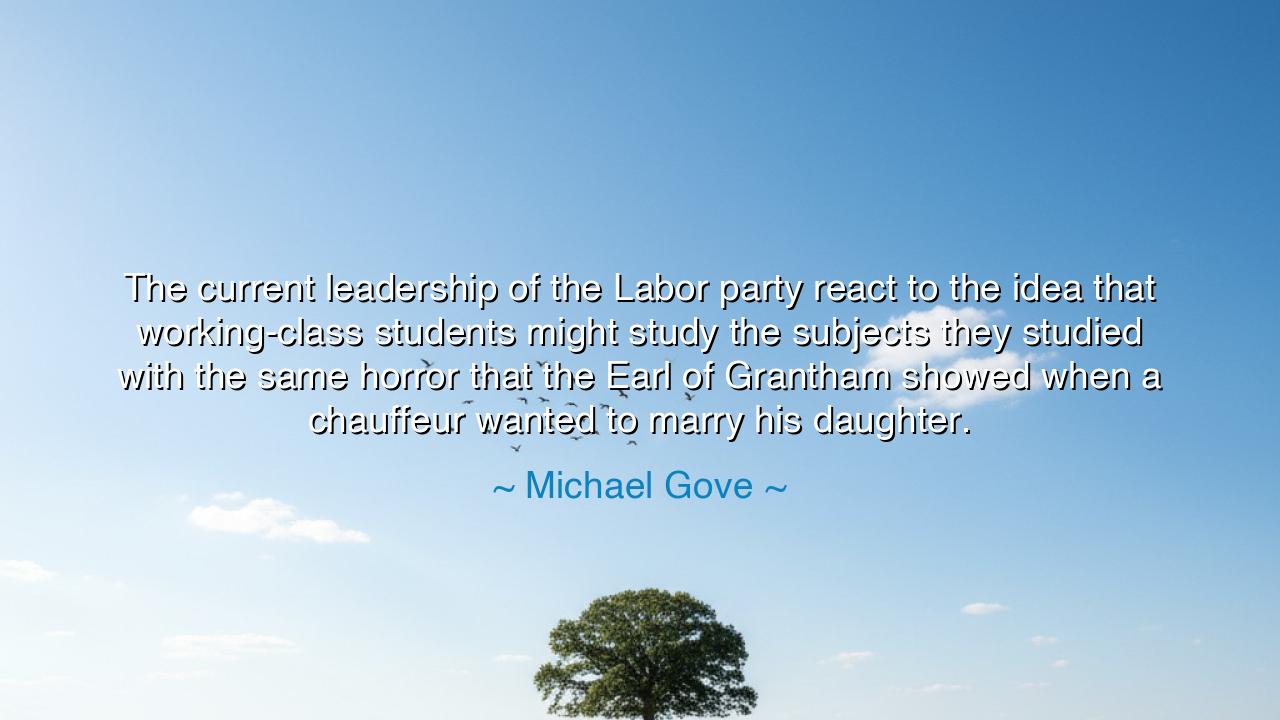
The current leadership of the Labor party react to the idea that
The current leadership of the Labor party react to the idea that working-class students might study the subjects they studied with the same horror that the Earl of Grantham showed when a chauffeur wanted to marry his daughter.






The words of Michael Gove strike with both wit and indignation: “The current leadership of the Labor party react to the idea that working-class students might study the subjects they studied with the same horror that the Earl of Grantham showed when a chauffeur wanted to marry his daughter.” In this sentence, he unveils the hypocrisy of elites who, though themselves beneficiaries of lofty education, recoil at the thought of the same treasures being opened to the poor. With biting comparison, he likens their reaction to the disdain of an aristocrat confronted by the challenge of social equality. Education, he implies, remains chained to class prejudice unless courage breaks those chains.
At the heart of his statement is the belief that knowledge should not be the privilege of a class, but the inheritance of all humanity. If the leaders of a party who once championed the working people now shrink from granting them access to the highest studies, they betray their mission. Just as the Earl of Grantham, in fiction, feared the mingling of aristocracy and service, so too do modern leaders sometimes fear the mingling of labor and learning. In both cases, the reaction reveals not reason, but pride, not truth, but fear of losing privilege.
History bears witness to the power of such prejudice. For centuries in Europe, Latin, philosophy, and the sciences were reserved for the nobility and clergy, while peasants were told their place was in the field, not the library. The spread of education through the Renaissance and Enlightenment shattered these barriers, giving rise to inventors, thinkers, and reformers who were not of noble birth. Yet, even now, echoes of this old arrogance remain, disguised in subtle resistance to the education of the working classes in disciplines deemed “too lofty” for them.
Consider the story of Andrew Carnegie, the steel magnate born into poverty in Scotland. Denied the privileges of elite education, he taught himself by devouring books in his youth. In time, he rose not only to wealth, but also became one of history’s greatest patrons of libraries, believing with all his heart that education should be the ladder for the poor to climb out of poverty. His life embodies the very truth Gove defends: that the brilliance of a mind is not bound by the class of its birth.
The deeper meaning of Gove’s words is not simply criticism of a party, but a reminder of the eternal struggle between elitism and equality. When those in power, whether aristocrats of old or politicians of today, recoil at the empowerment of the poor, they reveal a fear: that knowledge will level the playing field. And indeed, it does. For education is the great equalizer, the weapon that gives the child of the miner as much chance to ascend as the child of the lord. To deny this is not only unjust but destructive to the future of society.
The lesson for us is timeless: never guard knowledge as a private treasure. Do not place barriers around disciplines, declaring them “unsuitable” for some. Encourage every soul, rich or poor, to pursue philosophy, science, literature, and art. For in these pursuits, society itself is enriched. The brilliance of the next great leader, thinker, or reformer may lie hidden in the child of a factory worker, waiting only for education to awaken it.
Therefore, O listener, remember Gove’s words: do not let prejudice chain the gates of learning. Reject the arrogance that hoards knowledge for the few. Celebrate instead the dignity of every mind, and open wide the doors of education. For the true measure of leadership is not how high one rises above others, but how faithfully one lifts others up to join them. Knowledge belongs not to the elite, but to all who hunger for it. And only when every child, of every class, may study the highest subjects, shall a society be truly just.






AAdministratorAdministrator
Welcome, honored guests. Please leave a comment, we will respond soon